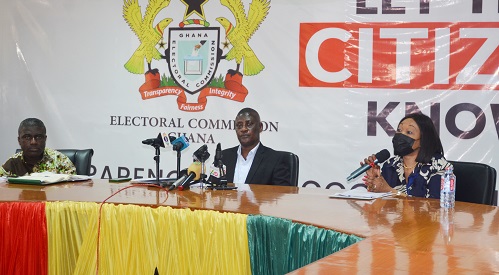
The Electoral Commission (EC) is targeting to register between 450,000 and 500, 000 eligible voters onto the electoral roll annually under its continuous voter registration exercise to be rolled out soon.
The all-year-round registration of Ghanaians who are at least 18 years old and have not previously registered as voters, replaces the periodic registration exercise where registration took place only for a limited time.
It is one of the reforms under the Constitutional Instrument on Public Elections (Registration of Voters) which the Commission would lay in Parliament when it resumes from recess.
At a media briefing in Accra on Thursday, the Deputy EC Chair in charge of operations, MrSamuel Tettey, said the target was set based on the data that the National Identification Authority (NIA) had registered more than 17 million Ghanaians for Ghana Cards, the sole form of identification for the exercise.
“On the strength of these numbers, we are convinced that the one million applicants we are expecting to register as at now following the last registration exercise in 2020 are more likely to possess the Ghana Card.
“We believe that of the 17 million people the NIA has registered, it is likely the 450,000 to 550,000 people we will register annually have the card,” he explained.
MrTettey said EC was not compiling a new voter register but was enabling eligible voters to walk into any EC district office at their own leisure, to be added to the 17 million plus voters, devoid of the long queues and chaos that usually characterised the periodic registration.
On the use of the Ghana Card as the sole form of identification for registration which had generated controversy, MrTettey said, it was a solution to the challenges of the guarantor system which was often exploited to get minors and foreigners onto the electoral roll.
He said the guarantor system was not the best under any circumstances but the EC did not have any option since there was no means to identify all the registrants until the Ghana Card was introduced.
The Deputy Commissioner said the use of the card was in conformity with the 2012 National Identity Register Regulations, Legislative Instrument 2111, Regulation 7 (1) which mentions registration of voters as one of the mandatory transactions the card could be used for.
He said although the Ghana Card was not the only requirement for registration, at the end of the registration exercise in 2020, more than 60 per cent of registered voters (about 10 million) used Ghana Cards as the main source of identification.
He clarified that Ghana Cards would not be used for the 2024 elections.
The EC Chair, Jean Mensa, assured the public that people would not be disenfranchised because since the registration for Ghana cards started at 15 years, persons who would turn 18 years by 2024 had more than two years to get the Ghana Card for the voter registration.
Additionally, she said, unlike the SIM re-registration which was also using the Ghana Card as the sole form of identification, the voter registration did not have a limited time frame.
She, however, called on the NIA to expedite action on the distribution of the Ghana Cards to enable eligible voters to take part in the exercise which could begin by the end of the year.
BY JONATHAN DONKOR


